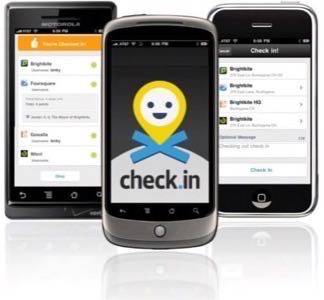Over the past couple of weeks, I’ve been using Check.in, the browser-based “check in” application that registers your current location with a variety of location-based social networking applications, including Foursquare, Gowalla, Brightkite, Whrrl and TriOut. The app was cooked up by the Brightkite team in an effort to simplify the process of using multiple services such as these, an ongoing frustration among LBS (location-based-services) early adopters.

So how did it fare? Not bad at all, if I do say so myself.
First, full disclosure: I’m not what you would call a heavy user of location-based social networking services. I have no mayorships. I visit incredibly boring places. I only started using Gowalla so I could try out Check.in.
However, I’m not so old and boring (yet) that I can’t see the appeal of these services. In my younger, more active days – before I was tied down to a life of diaper runs and other errands – an app like Brightkite or Foursquare would have been a blast to use. But sadly, I never got to experience those types of services back when they would have been the most fun for me – heck, I don’t think any of my college friends even had cell phones. (You kids have it so good, you have no idea).
That being said, I really enjoyed using Check.in. It was incredibly easy to use, always found my location accurately and worked without error or crashes.

My only complaint was that the app was slow at times, even when I had a good signal, although that could be due to the fact that it was still in private beta. Perhaps they haven’t thrown enough computing power behind it yet?
Sometimes this slowness, which often occurred during the “magical place matching” screen, was a major issue. When doing drive-by check-ins (a.k.a. “quick stops”), for example, I found myself leaving the venue before the processing was done. Curse you Starbucks drive-thrus and your speedy service! I will never be mayor!
We Need a Place-Matching Database
Another issue, and one that Brightkite has no control over, is the lack of a unified places database, as TechCrunch mentioned earlier this morning. Brightkite is on board with this idea, but the other major players need to agree, too, in order for it to work.

What this means in terms of app usability, though, is that you often have to tell it that Location X on this service is the same as Location Y on that service. Check.in, for what it’s worth, walks you through this process with ease, but it can slow down check-in time even further.
In other words, if you feel stupid “checking in” to places and try to get it over with quickly before you have to explain yourself to your non-early-adopter friends and family, Check.in won’t solve that problem – it makes it worse.
Solid, Well-Built App
Outside of these inconveniences, neither of which are necessarily Brightkite’s problem, I can report that Check.in is a solid, well-built app. As you check in to the various services via Check.in, the app also returns relevant data, new mayorships, points, etc.
The app has also been improved during the beta period with better, tighter privacy controls, and sharing settings for posting to Twitter and Facebook.
Insights and Future Plans
The Brightkite team shared a few early insights from their beta trials, which involved 6,000 users and 135,000 check-ins. The average user checked in 20 times, more than 2.3 million places were queried and most users checked in to two or three services at once. Friday is the busiest day for check-ins and Sunday is the quietest.
The team now wants your feedback as to what needs to be added or improved next. They’ve asked Yelp to open up its API, but so far the company has said no. We suggest it consider adding another major LBS player, Loopt. According to the Brightkite blog, it appears that service is also considering Check.in integration into Brightkite’s native apps, a decision that could easily make Brightkite the top LBS-based app across multiple platforms.
















